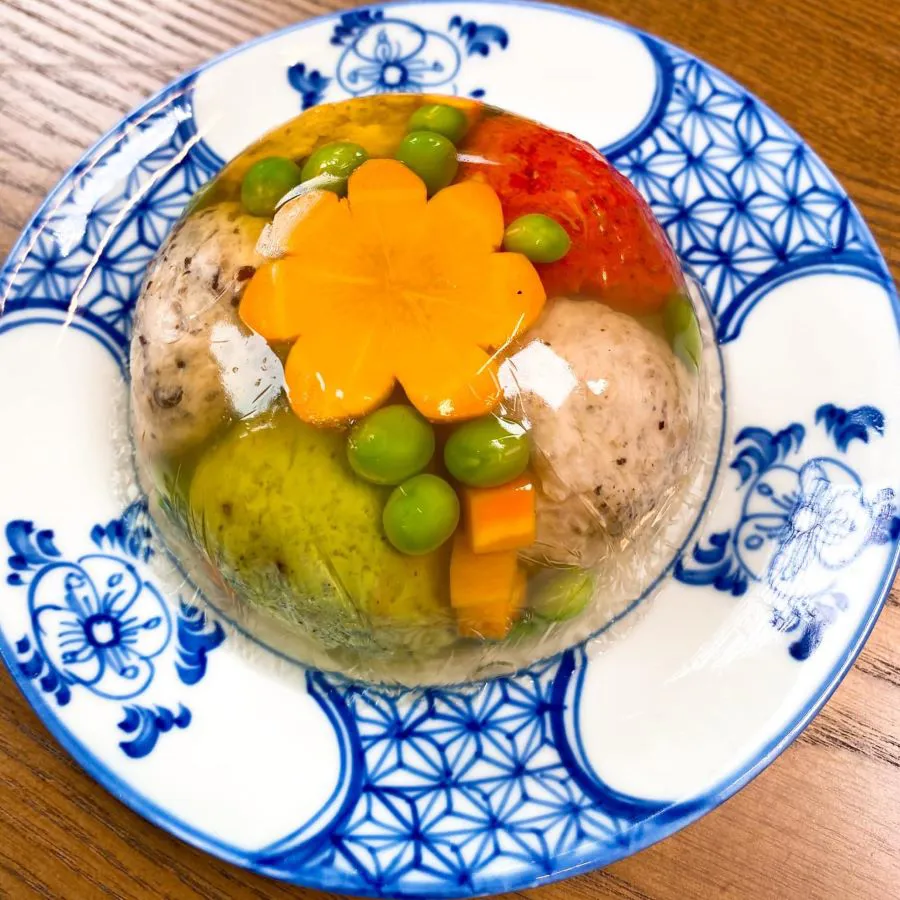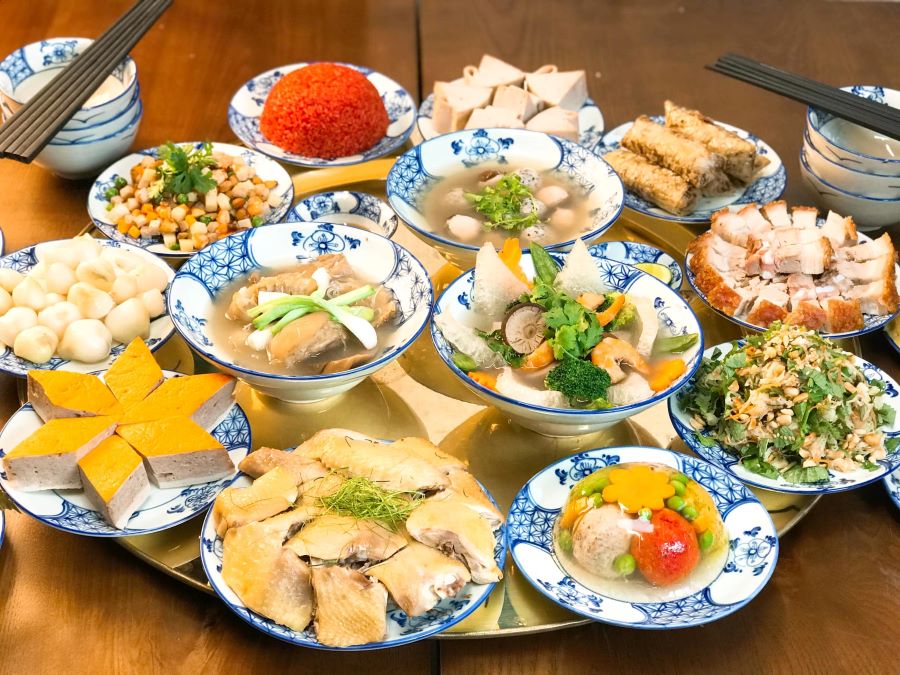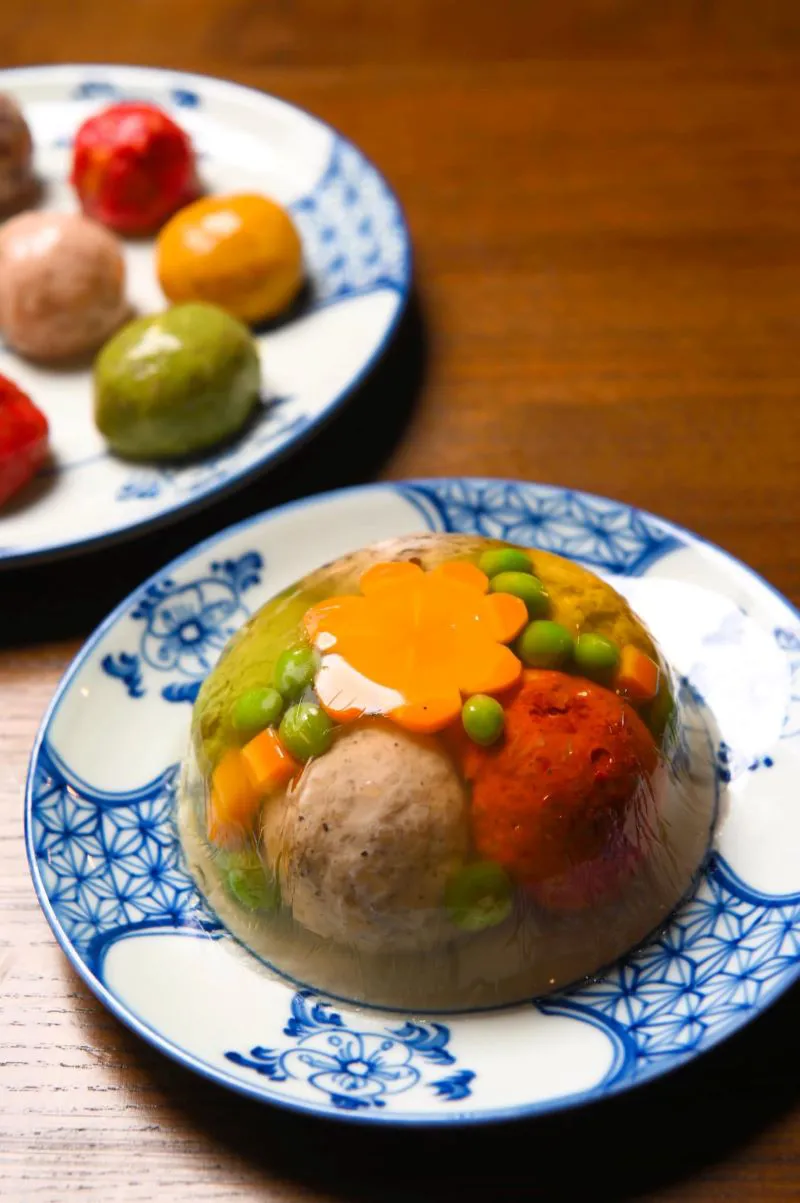Five-colored cloudy meat jelly enriches nuances of Tet feast
Hanoi is famous for its excellent specialties, including the dishes meticulously prepared for the Tet holiday.
Moc Van Am, or cloudy meat jelly, is an ancient Hanoi dish for spring celebrations which is almost lost. It used to be an indispensable part of the Tet feast tray, which included "six bowls and eight plates" prepared by grandmothers with meticulousness and ingenuity.
| The Moc Van Am is a collection of five meatballs in five colors, representing the Wuxing or Five Agents, and a wish for a prosperous New Year. The unique dish is a specialty of Hanoi culinary expert Nguyen Phuong Hai. |
Moc, or steamed pork meatballs, have been around since the Le Dynasty and originated in Moc Village, Nhan Chinh Commune, now Nhan Chinh Ward, Thanh Xuan District in Hanoi. This is also the hometown of many ancient royal cooks. Legend has it that one of them created moc van am, served it to the king and was rewarded handsomely. After that, the dish was only offered to the king or prepared at banquets given by him. Through the ups and downs of history, moc van am has become a staple on theTet menu of Hanoi's commoners.
The main ingredients are raw pork paste and two types of pork rind. First, shreds of pork skin are mixed with shredded white wood ear, raw pork paste, pepper and spices. If you want the balls to be crispy and chewy, you have to mix them thoroughly. Every time the grandmothers finished this step, they often had to... sit down for a breather.
Meanwhile, some of the pork rinds is boiled and dropped into the broth, where it later appears like wisps of cloud in the jelly - hence the fancy name 'van am' or 'cloudy'. However, this characteristic has now been forgotten, even by old Hanoi cooks.
| A traditional Vietnamese Tet feast prepared by culinary expert Nguyen Phuong Hai. |
The second type is pork rind pieces - the result of deodorizing pork rind with chopped ginger wine. They are then boiled for the broth, the scum is skimmed off and spices are added. They can be accompanied by pork shoulder and leg bones, soaked in salt water and ginger wine, then blanched before boiling. Fussy families even add dry-roasted peanut worms and simmer the broth for several hours until it is clear and ivory-colored.
Let's move on to the meatballs. For coloring, green can be borrowed from medicinal herbs such as Sabah snake grass, Chinese folding leaves, pandan leaves, and magenta leaves; yellow from gardenia seeds soaked in boiling water; red from gac fruit seeds beaten with strong wine; black from chopped wood ear or shiitake; and white from the pork paste itself mixed with white wood ear.
The mixture of pork rind shreds, diced neck fat and white wood ear is divided into five portions, each of which is then mixed well with one of the colorings using a separate set of spoons and bowls. When kneading the meatballs, put a little water on the palm of your hand - this step requires clean, bare hands without gloves. A ball should be slightly larger than a large Indochina dragon plum or the size of a peeled water chestnut and flattened like this.
Once steamed, the meatballs are left to cool and arranged in small bowls. It should be noted that the order is not random but must correspond to the cycle of mutual generation. In particular, the white ball (metal) is followed by the black ball (water), the green ball (wood), the red ball (fire) and the yellow ball (earth) - which is next to the white ball on the other side.
| Moc Van Am is a delicate, beautiful, tasty dish of ancient Hanoi. |
The five planets are embellished with wisps of cloud when pieces of pork rind are scattered around the mouth of the bowl and the cooled, boiling water is poured in. Today's refrigerators make it easy for the broth to gel, but it took frosty weather in the past.
The bowl of finished moc van am was first offered to the ancestors on the altar. When the incense burning was over, the grandmother would take the bowl down, shake it gently and place it upside down on a plate. Remove the bowl and tah-dah! Delicious cloudy meat jelly would amaze all the family members around the tray!
A friend of mine, who is a professional cooking instructor on social media platforms and also from Hanoi, recreated this dish a few years ago. He invited me to try it. Just like the old days, with a beautiful presentation. I won't say it out loud, but I think to myself: if only there were a few clouds of rind floating around the bottom of the dish. And the size of the dish was a little big compared to the one my grandmother made, as I remember. For many years, my family stopped making this dish for Tet because it was very difficult for the cook. However, an old-fashioned "six bowls and eight plates" Tet feast would be incomplete without moc van am.














